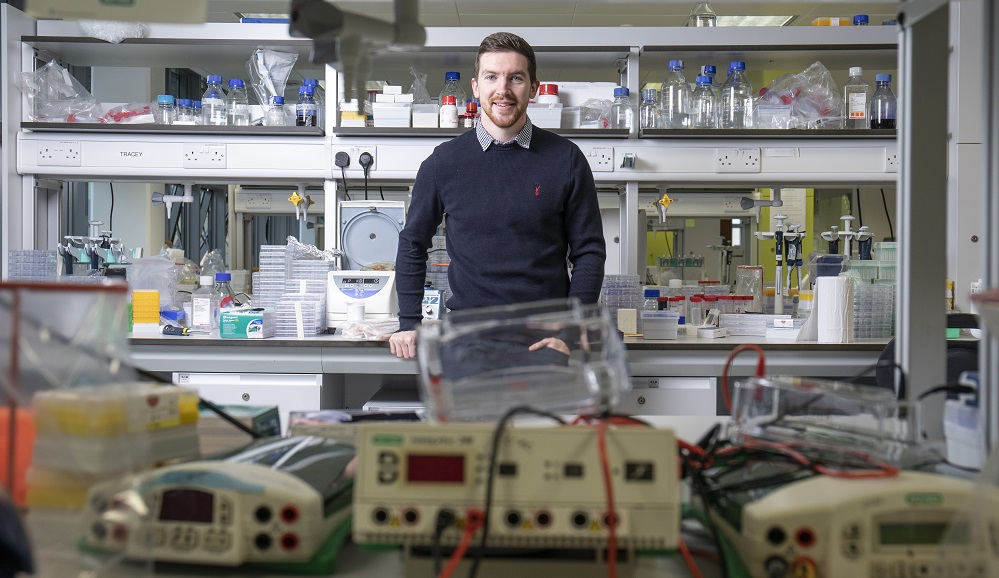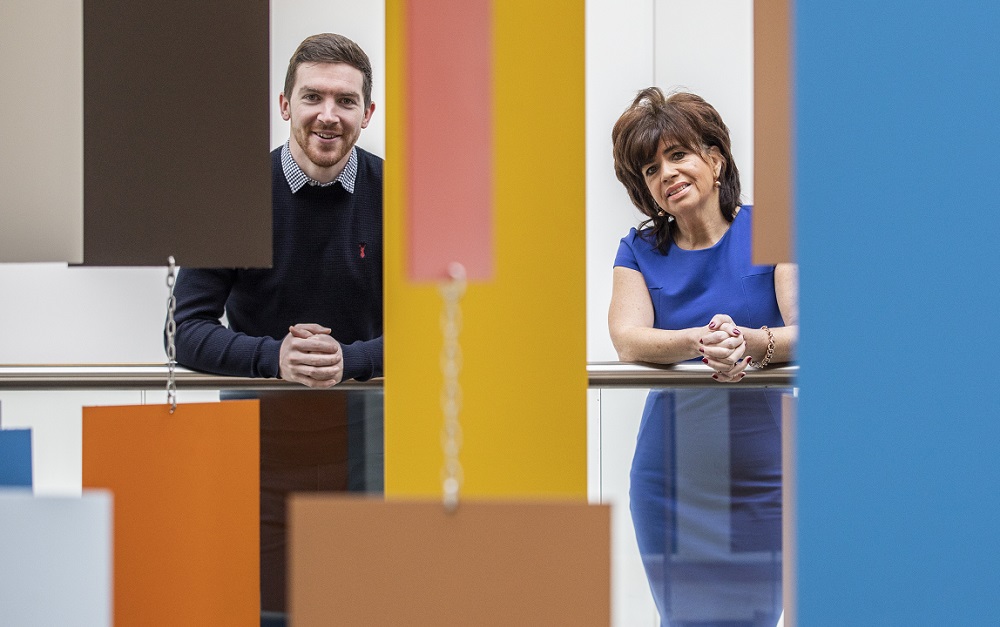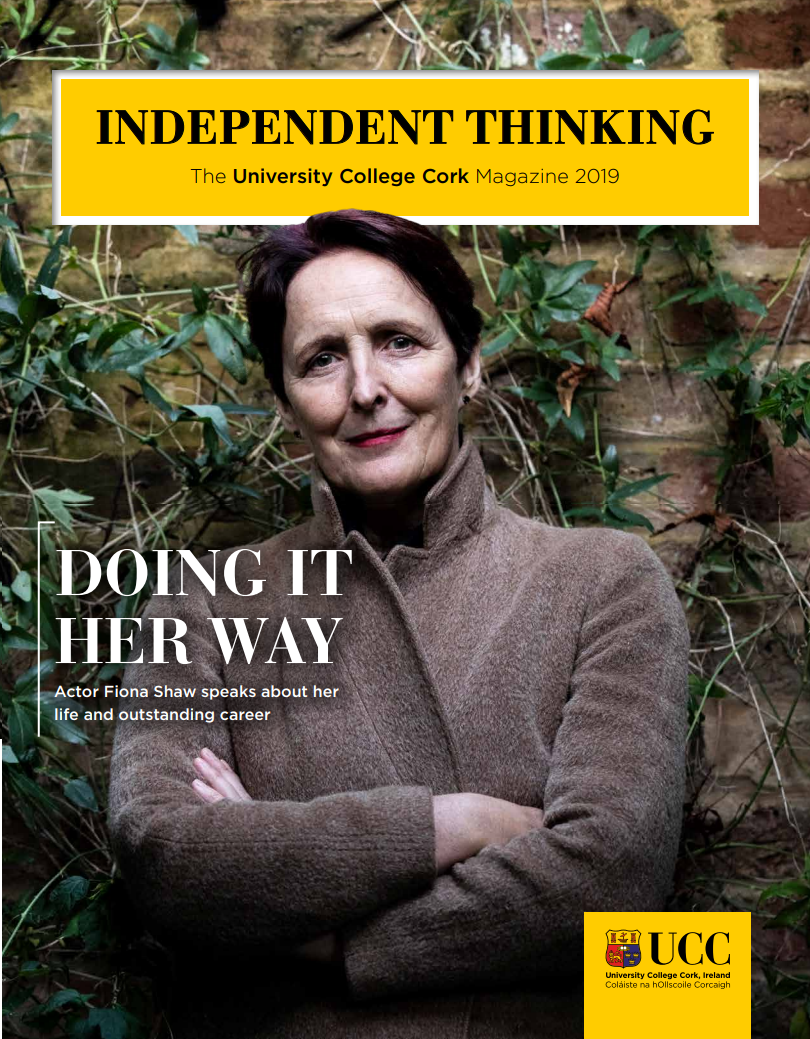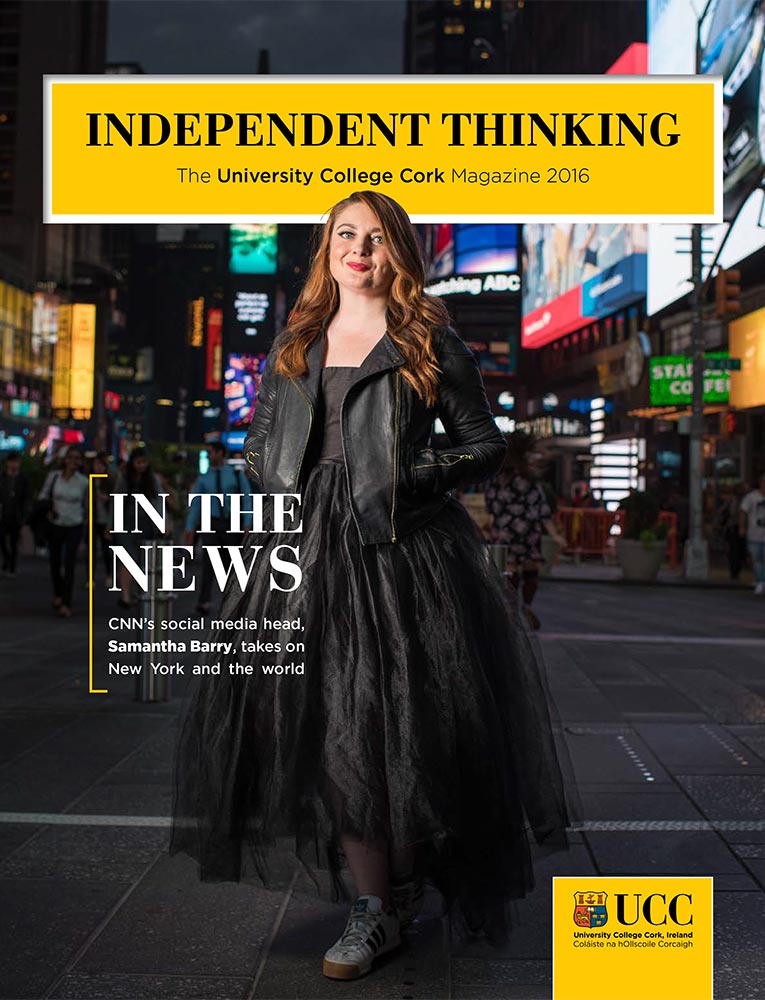Features
- UCC Springboard+: Kieran Egan
- UCC’s new Hub serves as ‘one-stop-shop’ service for 26,000 students
- Interview: Ryan Tubridy chats politics, history and his love of the arts on UCC visit
- UCC Emergency Care Society gets hands-on with life-saving skills
- Fitzgibbon Cup glory for UCC as hurlers beat IT Carlow in thrilling final
- GatewayUCC bridging the gap for research-entrepreneurs
- Pocket-sized brain injury monitor could be a game-changer for infant health
- Future of Irish hockey in safe hands with rising star Hannah
- Dr Eithne Hunt: Healthy habits for body and mind
- From Architecture to Web Development
- Nine APC Microbiome researchers make prestigious ‘highly cited’ list
- UCC honours five exceptional alumni at annual awards ceremony
- UCC spotlights four of its brightest up-and-coming female career scientists
- Rich Ferrie leads an exciting new era for UCC Innovation
- UCC honours its graduates with the official naming of the Alumni Bridge
- New UCC series explains how university research impacts daily life
- UCC's rising sports stars presented with scholarships
- UCC ranked among top universities in Europe for teaching excellence
Times Higher Education Europe Teaching Rankings 2019
- UCC makes Green Flag history…again!
The first university in the world to be awarded a fourth Green Flag
- Blazing a trail
Professor Helen Whelton charts her path to success, from curious dentistry student to global award-winner
- A Summer’s Evening on the Quad hits the right note for Cork charities
The fundraising event is now in its 14th year
- A curious mind
Paul Ross on his love of science, his greatest moments of discovery, and the exciting next chapter at APC Microbiome Ireland
- Mind your microbiome: 9 ways to boost your gut health
In honour of World Microbiome Day
- UCC hosts top wind energy experts at Cork’s largest ever conference
Scientists and engineers gathered to discuss the future of renewable energy
- Lord David Puttnam makes a passionate case for careers in the arts
He features in the latest episode of UCC’s podcast, Plain Speaking
- Funding announced for UCC SFI Research Centres
- Beekeeping makes life sweeter for Cork kids
- Saving Ireland's seals with GPS
- UCC celebrates a stellar year in sport
- Tommy Fleming headlines A Summer's Evening on the Quad
Tickets available now
- UCC ranked as global leader for sustainable social and economic impact
Times Higher Education University Impact Rankings
- Former UCC President Michael Murphy becomes first ever Irish President of EUA
Professor Murphy served as UCC President for 10 years
- MaREI researcher returns from epic adventure in search of blue whales
Dr Ailbhe Kavanagh spent seven weeks in Antarctica
- Doireann Ní Ghríofa among six new members elected to Aosdána at UCC ceremony
Writer Doireann is a UCC alumna
- Former White House drug advisor goes 'inside America’s opioid crisis'
Keith Humphreys is the latest guest on UCC's official podcast, Plain Speaking
- UCC launches Sports Strategy
Pride on our chest, belief in our heart, sport in our bones.
- How Nicole Ryan is powering change after tragedy
Alex’s Adventure
- Brainwave ‘donation’ research offers promise for dementia treatment
Research and innovation
- Full-circle for Paul as UCC extends partnership with Cork City FC
A perfect match
- Praise for The Irish Revolution as 'Atlas' documentary airs on RTÉ
Atlas of the Irish Revolution
- Pastures new
UCC launches its Food Institute
- Making waves at MaREI
Ireland's National Ocean Test Facility opens
- Research spotlight: APC Microbiome Ireland
10 researchers among Highly Cited
- Spin-out success
Atlantia Food Clinical Trials expanding stateside
- Billy Morgan: Pride of Cork
Marking a decade of UCC Sigerson Cup football
- The future is bright for soccer's Captain Fantastic
Ciara McNamara
- The next phase for rugby's rising star
Jack O'Sullivan
- RTÉ to air 'Atlas' documentary
The next step for the Atlas of the Irish Revolution
- Top business talent share their secrets to success
CUBS Conference 2019
- Green roots and flying boots: Cork Chamber project showcases ‘future’ of Cork
Future Forms is part of Cork Chamber’s 200th anniversary celebrations
- CEO and camogie star Mary O'Connor is leading change for women in sport
Moving the goalposts
- Mary Robinson is the first guest on UCC’s new podcast
Plain Speaking is now available to stream
Pocket-sized brain injury monitor could be a game-changer for infant health
Research-entrepreneur and UCC PhD student, Mark O’Sullivan, is in the process of developing a spin-out company around a portable, pocket-sized device that monitors and diagnoses brain injury in newborns. Here, he discusses the technology and research behind Neurobell, and the invaluable experience of participating in GatewayUCC’s SPRINT Accelerator Programme.

A pocket-sized medical device that monitors and diagnoses brain injury in newborns could prove to be a game-changer for infant health.
Mark O’Sullivan, a UCC PhD researcher, is in the process of developing a small, portable, battery-operated device which could in the future replace the more heavy-duty EEG machines currently used in hospitals.
Mark, who studied Electronic Engineering at undergraduate level and completed an MSc in Music Technology, specialising in Audio Signal Processing, is undertaking his PhD with the INFANT Research Centre and the Embedded Systems Research Group in UCC’s School of Engineering.
The idea behind the Neurobell device evolved while Mark was researching EEG (electroencephalogram) signals (the signals produced in the brain) and how, through monitoring and processing them, he could come up with better methods of detecting brain injury.
“INFANT developed the ANSER algorithm, which can detect seizures in newborns and is now licensed out and is actually making an impact. My goal would be that the Neurobell project I’m working on now would be the next step forward” – Mark O’Sullivan
Mark and his colleagues realised pretty quickly that there was huge potential for designing a device that could be ‘a disruptive technology in the field’.
“Currently, EEG monitors are large machines that are rolled into wards. It can take up to an hour to apply dozens of electrodes across the baby’s head and then set it up on a laptop or PC,” he explains.
“We figured out that all the electronics in that machine can be developed into a pocket-sized device.”
The ramifications, he explains, are potentially game-changing.
Firstly, by equipping doctors with a pocket-sized device, gone are the days of waiting hours for an EEG machine to be rolled into the ward.
But what’s the substitute for the neurophysiologist who, conventionally, is the one who comes in and reviews the hours and hours of recorded EEG data? This is where INFANT’s expertise plays a commanding role.
Delighted to represent the <ahref="https://twitter.com/infantcentre?ref_src=twsrc%5Etfw">@infantcentre at the 2019 @AIAwardsIrl and to take home "The Best Application of AI in an Academic Research Body" award for the use of AI for diagnosing brain injury in newborns.
— Mark O'Sullivan (@markosullivann) November 20, 2019
Thanks to @OSheaAli for her work & application for the award. #aiawardsirl https://t.co/y49T7Zl5pa
“INFANT developed the ANSER algorithm, which can detect seizures in newborns and is now licensed out and is actually making an impact,” Mark explains.
“My goal would be that the Neurobell project I’m working on now would be the next step forward; where we have developed similar algorithms and implemented them on a portable device.”
While Mark was well-supported by the expertise of INFANT and the Embedded Systems Research Group when it came to the ethical, regulatory and technical elements of his project, with plans to develop this product – and a company around it – he needed to learn the basics of commercialising the technology.
Enter GatewayUCC, a state of the art Innovation and Incubation Centre based at UCC, and one wing of UCC Innovation.
Mark was accepted onto GatewayUCC’s SPRINT Accelerator Programme. Designed to support early-stage start-ups, entrepreneurs and UCC-based researchers, SPRINT focuses on commercialisation of UCC-generated technologies and routes to market. The programme covers all aspects of the commercialisation process; from business strategy and legal issues, to crafting an elevator pitch and building a team to scale a business.

“I knew at that stage that, while I love the engineering side, I also wanted to pursue this and get this out of the university and into clinicians’ hands – that takes commercial expertise and knowledge which, at the time, I didn’t have,” explains Mark.
Starting SPRINT in October 2018 gave Mark his first experience of commercial development, and each module helped him to build a solid foundation of the essentials he needed to progress his research into business.
Every week offered a different lesson for Mark – financial basics, how to raise funding, the all-important regulatory elements, and beyond. With frequent seminars delivered by experienced entrepreneurs and industry experts, the opportunities to build a strong network were second-to-none.
“If there’s anything that I’ve learned, it’s that in business, your network is essentially everything. So, having these extremely high-profile individuals coming in to talk to us was really valuable,” he says.
"I now feel comfortable thinking and talking in a more business-minded language, which helps when talking with investors, and industry or enterprise office reps" – Mark O’Sullivan
Another skill that has proven to be invaluable, is learning the ‘lingo’ of the business world.
“I’m now at the stage where I’m applying for Enterprise Ireland funding,” says Mark. “Such applications are extremely commercial-based and, without the knowledge I got in Gateway, I don’t think I’d be able to go through the application process without additional support.
“And I now feel comfortable thinking and talking in a more business-minded language, which helps when talking with investors, and industry or enterprise office reps – I think they can see value in that."
So, what’s the next step for Mark? Well, right now he is firmly fixed on developing his research and product into a spin-out company.
“With medical devices, it takes a long time to get there; in terms of getting through the regulatory steps, clinical investigations and, eventually, getting onto the market. So, I’ll be involved with UCC for another couple of years, but the overall aim is to get this into a start-up,” he says.
What is driving Mark right now, he says – due, in part, to the guidance of his PhD supervisors: Emanuel Popovici, Andriy Temko and Geraldine Boylan – is the prospect of making a positive clinical difference and benefitting others.
“The more I dig into the clinical side, the more I realise that this is something that could really have an impact – and that helps to drive me even more.”



